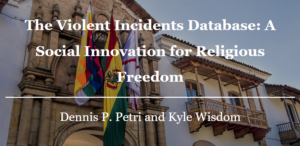
The launch of the Violent Incident Database continues to generate an impact in different spheres dedicated to the study and promotion of religious freedom. IIRF directors participated in the International Religious Freedom Summit 2024 representing the International Institute for Religious Freedom.
Dr. Dennis Petri, IIRF International Director, participated in the panel discussion concerning “Social Innovation for Religious Freedom” where he introduced the Violent Incidents Database (VID), and shared the methodology applied during the research and collection of incidents.
On the second day of the event, Dr. Kyle Wisdom, Deputy Director of IIRF, participated in the panel on “Concerning Trends in Latin America” where he presented how the Violent Incidents Database supported IIRF research on Latin America and highlighted the importance of reporting and data collection.
After their presentation at the IRF Summit 2024 in Washington D.C., the Center for the Study of Law and Religion at Emory University invited our directors to publish an essay in their digital publication “Canopy Forum,” a platform that shares expert analysis for scholars, lawyers, clergy, journalists, policymakers, and the broader public.
The essay delves into the transformative potential of the Violent Incidents Database (VID).
The database fills a gap among religious freedom measurement tools through offering an event-driven collection of FoRB violations that help document undetected religious freedom violations. The VID has expanded beyond its regional focus in Latin America after making significant contributions to religious freedom in this understudied region.
The VID is not meant to be an instrument that stands alone. It complements the growing set of tools available to monitor religious freedom across the globe. The International Institute for Religious Freedom is pleased to make this information available as a part of its mission to promote religious freedom for all faiths from an academic perspective.
We invite you to read the full essay here.